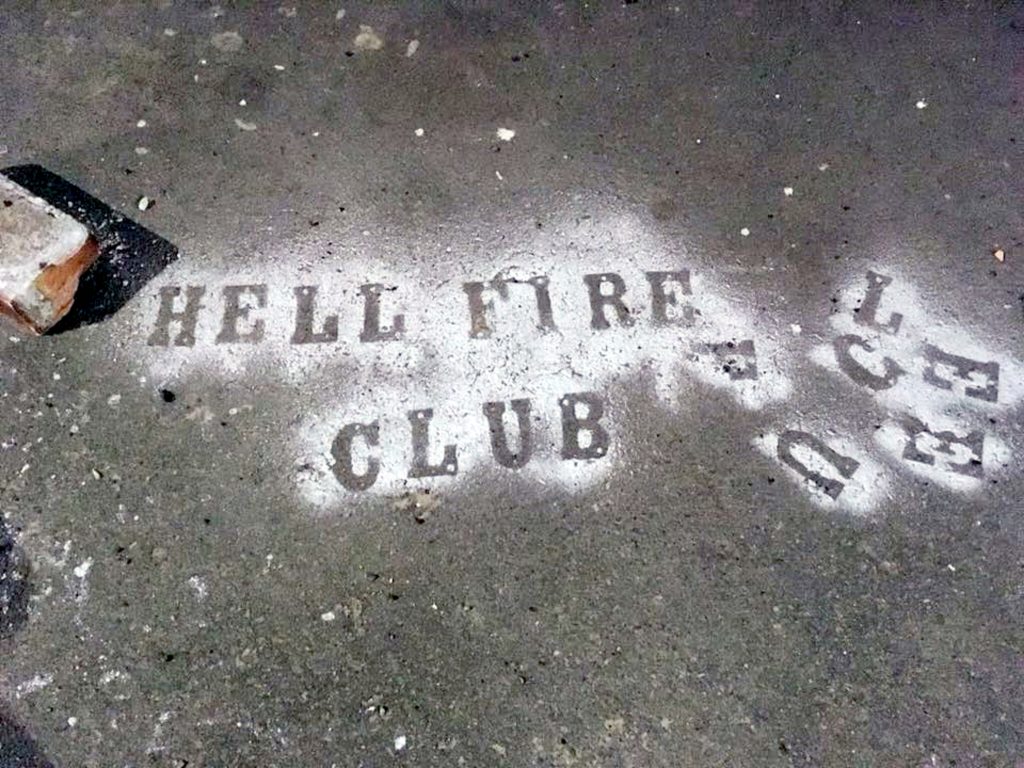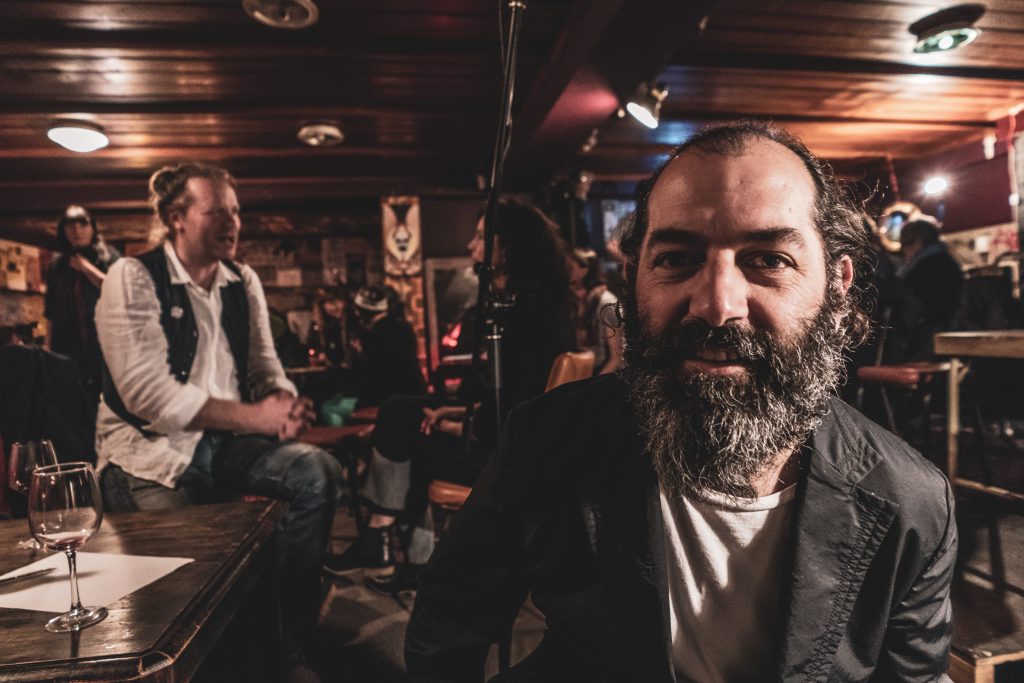Fringe dwellers, story tellers, and a used-to-be-bar that somehow still is.
At the bottom of a small staircase, in a low-ceilinged basement, the darkened space is lit by candles and the flickering of an open fire. People in coats swarm the bar. There’s a microphone stand in the corner. It feels intimate, familial even. The pub’s Nepalese chef is busy, and staff are dispensing plates of plump, steaming momos at pace across the room, weaving through the bucket hats and beanies.

It’s poetry night at The Commoners Bar in Lyttelton, a small port town on the outskirts of Christchurch. The pub is in the basement of the circa-1947 British Hotel. Set across from the wharf, it’s a building which, if it could, would brag of a chequered and salty history, of many a sailors’ brawl. But tonight, it’s poetry. Outside, the port clatters with life, a glowing nucleus in the heart of Whakaraupō, Lyttelton Harbour. The crowd is made up of “professional” feature poets (though they’d baulk at the label), anxious open mic-ers and, the majority, watchers and listeners.
One by one, the poets get up. The audience is rapt, the words sharp and honest and funny. Some poets are drunk, some are not. Many swear, but compared to the old days (same basement, different bar) it’s pretty tame, apparently. There is a poem about Lyttelton called ‘Ode to Port Emo’, by a local named Popi, and it raises appreciative laughs and nods.
There are raps and songs, stories of heartbreak and pubic hair and naked wrestling a flyaway gazebo at dawn. There are poems about the (very sweet) love language of text messages. There’s one which declares Lyttelton the heathen capital of the country, and tells the story of a shouted conversation with a certain “Māori Jesus” who lives above the bakery.

This Māori Jesus is also known as Ben Brown. He is one of Lyttelton’s most treasured poets and authors, and, as of May 2021, is Aotearoa New Zealand’s first Te Awhi Rito Reading Ambassador. More on that later. Ben is a Lyttelton staple. The Māori Jesus moniker comes from his poem, ‘I AM: The Māori Jesus’, a response to James K Baxter’s infamous ‘The Māori Jesus’.
Ben’s been living in Lyttelton since the early 2000’s (and coming for fish and chips since the eighties) and has a pretty good idea what gives the place its flavour. “It doesn’t suffer fools and fakers,” Ben says. He is clearly neither. “It’s through a tunnel, so it almost has a bolthole feel to it. It’s a border, it’s fringe land and there’s something in that.” The town of 3000 clings to the steep sides of an extinct volcano. Houses flank a hillside that spends winter in a cold shadow. Everything leads downwards to the harbour and to the main road, which overflows with cafes, venues and gig posters.
Gentrification is creeping in, but for Ben, Lyttelton still has grit. “It used to be a divey place, with a bad rep,” he says. “Artists move into those kinds of places and artists bring other artists. So yeah, it’s got more than its quota of eccentrics and recovering addicts and alcoholics. They’ll give you a second chance here, though.”
But prove yourself anti-social, well, there’s a reason none of the bars have bouncers. “They don’t need them, the locals will take care of that shit. I do think it’s part of that union vibe, there’s an egalitarian thing going on.” Ben gestures over at the police station. “But it fascinates me that people have the idea it’s a rough place. That place is barely manned.”
Lyttelton is known for its musos and artists. Margaret Mahy, Gary McCormick, Marlon Williams and Aldous Harding are among the many to have sprouted from or flocked to the port and its surrounds. It’s a place that invites you to sit in a corner, any corner, and scribble in a notebook. It makes artists stick around, and non-artists linger in the hope that the art may rub off. The main drag, London Street, is often filled with the sound of the piano outside the Supervalue. As Ben writes in ‘Sidewalk Sonata’, an ode to the piano, this could be a builder with hard hands and a soft touch, a random drunk hammering on the keys or a kid who silences the street with Beethoven. Luck of the draw. It gets a lot of use.
Ben hails from a farm in Motueka, where his Aussie dad, a storyteller and a raconteur, would quote poetry in the paddocks. “Aussies have a yarn tradition. They like to elaborate,” he laughs. “Fucking smoko would always take twenty-five minutes coz Dad was telling a story. He was a well-read dude, so he got me into literature.” He has written poetry all his life. “As long as I can remember. I was that goofy kid with a notebook in his pocket. I was into rhymes, I was into language. I talked everyone’s ear off when I was a kid.” His words still come fast, his body moving with them. He considers the matter of stories. Says it’s both simple and complex, and almost impossible to sum up.
“I think storytelling is easy to overlook, and poetry for that matter,” he says. “Stories are how we find out about everything. They’re how you test yourself without having to get your hands dirty, you can imagine yourself in all kinds of roles.” He quotes Oscar Wilde’s statement about thinking in stories. “I think in stories. I always thought everyone did. You need that narrative. Our brains see patterns, they recognise structure, and that’s what a story gives you.”
Alongside other endeavours (labouring, market gardening, studying law for a couple of years, studying literature, publishing children’s books — which started as law lecture doodles — with his former wife), Ben has always written poetry. He wasn’t the only one in Lyttelton. He had a poetry show on the local radio station, inviting guests to read their work. The Wunderbar used to run a regular open mic, and then, in 2018, the Hell Fire Club opened its doors. A notorious and short-lived establishment, the Hell Fire was in the same basement of the British Hotel where The Commoners is today.
“The Hell Fire was an underground punk bar, rough as guts and a little bit dodgy, but very cool,” says Ben. “The owner was this ex-punk lady, quite talented in certain ways. A poet at heart, that girl, but she went a little bit far and the bar had to close.” The Hell Fire Club only lasted about a year, but before its somewhat mysterious demise, it was synonymous with poetry. Ben’s words were scrawled on the walls, and he recites them now in a Leonard Cohen-esque growl. “Ladders go to heaven, snakes go to hell. Daddy was a devil dog wishing at the well. Mamma was an angel in a diamante dress, Buddy was a rockstar, Sissy was a mess.”

Another local poet, the writer and playwright Andy Coyle, started hosting open mic nights at the Hell Fire, which drew poets from all over the country. Ben and Andy had met when Ben was running his radio poetry show. He brought Andy on as a guest and things evolved: they started doing gigs together and formed a band of poets, touring nationally as the Lyttelton Poets. Until then, Andy had mostly been speaking his words over music. “I always knew I was comfortable on stage,” he says, “so I’d just get up and do sections of my stories or prose that I thought sounded cool. Probably after seeing Ben perform, I saw the power that was available in a short piece.”
If a poem is a story compressed, Lyttleton has incredible energy for this. As Ben explains, “I think it’s the fact that it’s a fucking volcano so there’s a tension in the land. It’s the same feeling I get in Wellington, and that’s on a fault line. This is a spiritual place, the Māori talk about this place a lot. There’s a certain energy here that isn’t over there,” he says, gesturing towards Ōtautahi Christchurch. “You can feel it.”
Andy points to the history of poetry on ships, too. “I’ve met plenty of drunken sailors who actually really know their poetry. Maybe it’s the solitude, maybe it’s the adventure.” Perhaps in this spirit, he once booked the Lyttelton Poets a night of performing on the Interislander Ferry in exchange for a free passage. “We were dreading it as much as anyone else. 60 or 70 guys from some kind of bowling tournament arrived and gave us the cross-armed appraisal. But by the end we had them shouting us drinks, and confessing to their own poets in the family.”
As Aotearoa’s first Reading Ambassador, Ben’s brief is to inspire a love of reading for its own sake, and share the importance of storytelling. His message to teachers, parents and librarians is to read kids a story, every day. And to read it with mauri and mana, to do it with style.
In 2019, Ben was approached by Te Puna Wai ō Tuhinapo, the learning centre in Rolleston’s Youth Justice Facility, to work with a group of boys to produce a publishable object. “In my head, there’s only one publishable object and that’s a book,” Ben says. So he did a poetry workshop. “It turned out to be perfect: there’s no rules in poetry and these guys are great at no rules!”
“Being youth justice, there’s a dance you have to do. They’re going to try you out, you’re going to try them out. Then you’ve got to get past the ‘fucking poetry’ barrier. So I just said, ‘just tell your story’.” Ben says what eventuated was usually short, and really good — straight in there and honest. The result, How did I get here? Soliloquies of Youth, is in its fourth print run, which for a poetry book, according to Ben, is outrageous. “District Court Judges buy that book, defence lawyers buy that book. That’s got to be empowering for them. I hope it is.”
Ben, who has published around 18 books so far, says he still gets a buzz from something going to print. This is what he’s hoping to keep sharing with the kids. “Before you sat down and thought this stuff up, there was nothing there. Just by sitting there and thinking and applying your imagination and putting some words down on paper you’re creating an object that a total stranger is going to come along and find. It’s poetry, but it’s also a voice.”
As for the voices of Lyttelton, after Hell Fire closed, Andy compiled the Hell Fire Anthology, a collection of pieces from poets who had performed at the club. “Got a bullet hole in the ceiling somewhere,” the book’s preface reads, “Got burning coals in the hearth. Got devils in the detail. Keep it on the low down, underground subliminal, subterranean chic aesthetic, poster plastered punk Gods caught in an eternal preen cry ‘welcome’ in the doorway, a used-to-be-bar that somehow still is, a small wooden stage, a mic on a stand, a moment alone.”
Georgia Merton
Keep an eye out for the ‘Common Ground’ spoken word nights at Lyttelton’s The Commoners, run by Hester Ullyart.

